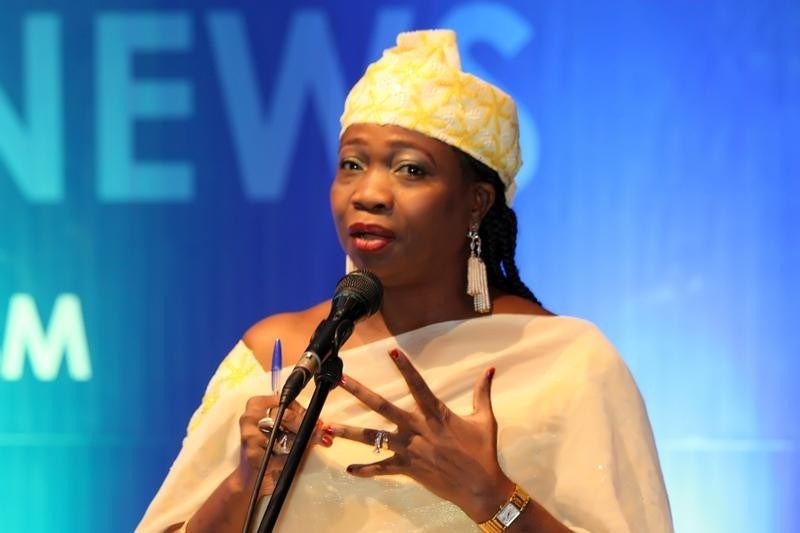
Senior Special Assistant to the President on Diaspora Affairs, Abike Dabiri-Erewa
JESUSEGUN ALAGBE writes about some claims Nigerians make to embassies and their ‘host’ countries to secure asylum status
Henry (not real name) recently contacted this writer for a story which he originated to be worked on and published in a national newspaper. In return, he offered to give a bribe.
He had outlined everything, including the story’s plot, which is thus: “He is gay (even though he’s not) and he’s being persecuted by anti-gay agencies of the Nigerian government.
He had been attacked several times, brutalised and dehumanised. His single bedroom apartment in the Mile 2 area of Lagos has been razed down by irate anti-gay people in the community and he is now homeless. He has been left stranded because he had to flee the community. His parents and siblings cannot also accommodate him, as they are afraid of being attacked for harbouring a homosexual.”
If the story was published in the newspaper, Henry told our correspondent he would take a copy with him to France or any of the Schengen countries in Europe, where homosexuality is not a crime.
He said, “When I get to France, I will go to a refugee camp – posing as a gay refugee – and present the newspaper report, among other documents, and I will use it to seek asylum.”
Asylum is a protection granted by a state to a person fleeing his home country because of persecution which can be in varied forms.
Prior to his newly conceived plan, the 29-year-old married man had been denied a Schengen visa, which allows free travel within chosen countries in Europe (including France).
The visa allows the holder a stay of not more than 90 days in the Schengen area within a period of six months (180 days) for tourist or business purposes.
If he had been issued the visa by the French Consulate in Lagos, where he applied for it and if his fabricated story had been published, Henry said he would have been a happy man as his dream of migrating to Europe would have come true.
“I paid about N35,000 to apply for the Schengen visa. I wanted to use it to travel to France, but my application was rejected. However, I will reapply later in the year,” he recalled.
Henry said he and his wife, sometime in 2017, applied to France embassy to seek greener pastures, but were both denied visas after coughing up over N200,000 for the applications.
He said the disappointment was what was prompting him to take the “alternative route” of pretending to be a gay, optimistic that his visa application, travelling abroad and subsequent issuance of permanent stay would be hastened. Apparently, Henry had a lot of encouragement as his elder brother and friends had followed similar routes to seek asylum abroad.
He added, “I have decided to follow this route so that travelling and settling down in France could be easier. I want a better life for me and my wife; so she’s quite aware of what I’m planning.
“I’m doing this for us. If I travel there, she will join me soon. I couldn’t have been planning this without her knowledge.
“Moreover, this was the same story line my elder brother made up when he travelled to France about 10 years ago. He posed as a gay and now, he has been offered 10 years’ stay in the country. He was given two months ago.
“But before being offered the 10 years’ stay, he applied for two years’ stay twice and three years’ stay twice. With the 10 years’ stay, he can now apply for permanent stay and citizenship. He now speaks French fluently and can work anywhere in the country.”
Henry stated that by also posing as a gay, backed with the publication of his made-up ‘horrible experience’ in Nigeria, he had a higher chance of being offered a permanent stay in Europe, like his brother.
He added, “If I got the Schengen visa and I travelled to France, I would pose as a refugee from Nigeria. I would probably be asked questions by the immigration officials reasons why I came to France.
“I would tell them I was being hunted in Nigeria because I’m gay – that my apartment in Lagos was burgled and burnt down because it is criminal to be gay in Nigeria. I would say I am not being accommodated in my own country anymore and I am being targeted by the authorities as well as the anti-Lesbian, Gay, Bisexual, Transgender people.
“I would probably be given a place to stay in the interim, and then I would again be questioned by the authorities. I would stand by my word that I’m gay and then they would probably first give me a one-year stay in France.”
Henry said he hoped to be paid a little allowance per month to survive in France and later on given a job.
“Being published in a newspaper would give my story some credibility and my welfare would be taken into consideration since they cherish human rights there,” he said.
Even though Henry studied Chemistry in the university and has a postgraduate degree, he said it had not been easy living in Nigeria, hence his decision to travel abroad by whatever means.
He stated, “The journey abroad might be tough sometimes. I know a friend who had to first travel from Nigeria to Ivory Coast, to Morocco, then to Turkey before finally arriving at a refugee camp in France. Definitely, I would do whatever it takes to leave this country.”
Nigerians claim gay status in UK, Canada
Apart from Henry, 32-year-old Lagos resident, simply identified as Sikiru, also contacted our correspondent to help him publish a story that he (Sikiru) was a gay.
He concocted a similar story to Henry’s, his childhood friend. Like Henry, Sikiru applied twice for a Schengen visa, but his applications were denied. However, he vowed to reapply notwithstanding the denial.
He said, “Life in Nigeria is not easy; I’ve not had any job since 2015 when the recession came. I don’t want to die here when there is a better life somewhere else. If you can help me publish an article that I’m a gay and that my community has turned against me because of my sexual orientation, I will take a copy of the newspaper with me anytime I’m travelling abroad.
“When I request asylum, I believe it would be processed quickly out of compassion. I know a couple of friends who are now living in Europe and doing fine.”
Apart from Europe, SUNDAY PUNCH found out that some Nigerian men seek opportunities in North America, particularly the United States and Canada with the same gay tale. A number of them have been granted asylum.
“Many Nigerians are now relocating to the US and Canada and the extent of desperation some go to obtain permanent stay is shocking,” said Olufemi Majekodunmi, a Lagos-based policy analyst.
Since 2014 when former President Goodluck Jonathan signed the Same Sex Marriage Prohibition Bill into law, many gay Nigerians have fled the country to countries like the US to seek asylum based on their sexual orientation.
The police have also arrested many homosexuals in the country, forcing some of them to either go underground or flee the country.
Specifically, in January 2019, the spokesperson for Zone 2 police command, Dolapo Badmos, warned homosexuals living in the country to flee or face criminal prosecution.
According to Majekodunmi, many homosexuals have since been fleeing Nigeria and being granted asylum elsewhere after claiming they are gays.
For instance, according to statistics released by the United Kingdom Home Office in November 2018, gay Nigerians topped the list of nationals who applied for asylum in Britain.
More than 5,917 asylum claims were said to have been made by Nigerians between July 1, 2015 and March 31, 2017 – all claiming they left Nigeria because of its “unfriendly gay laws.”
Fortunately for such claimants, the European Court of Justice in January 2018 ruled that asylum seekers in all 28 European Union countries must not be subjected to psychological tests to determine their sexual inclination.
Consequently, heterosexual persons, who desire to leave Nigeria for greater opportunities, have now started fabricating stories about their sexual orientation to enjoy asylum in their host countries. However, there have been some suspicions as Nigerian nationals are now the largest group seeking refugee status in Canada.
According to data received from the Refugee Protection Division of the Immigration and Refugee Board of Canada, Nigeria had 12,138 pending applications as of December 2018.
The RPD in charge of hearing and deciding claims for refugee protection in Canada noted that Nigeria had overtaken crisis-ridden Haiti which was number one the previous year.
The total number of pending applications from across the world stood at 71,675 implying that Nigeria represents about 17 per cent of total pending applications from the over 170 countries.
Haiti comes a distant second with 6,811 pending applications; India, 5,175; Mexico, 3,525; Colombia, which ended a civil war barely three years ago, has 3,056 and China 2,105.
According to the Canadian authorities, two out of every three Nigerian applicants claim to be victims of homophobic attacks.
In Canada, a refugee and immigration programme called Legal Aid Ontario said in 2017 that the agency identified an “unusual” pattern in sexual orientation claims filed by Nigerian refugee seekers in 2017.
As published on cbc.ca, around 70 per cent of Nigerian asylum claims made in Ontario, Canada, between April and November 2017 cited persecution based on sexual orientation.
A former head, Legal Aid, Jawad Kassab, said he was concerned that if sexual orientation claims were fabricated, refugees with legitimate claims might have a harder time getting the needed help.
A Lagos-based human rights lawyer, Mr Kolapo Adeyemi, told our correspondent on the telephone that claims involving sexual orientation would be difficult to confirm.
He said, “You don’t have a choice but to give them the benefit of the doubt.”
Lying their way to asylum camps
Due to Nigeria’s poor human development index, which entails factors such as high unemployment rate (23.1 per cent as of December 2018, according to the National Bureau of Statistics); poor infrastructure, low life expectancy (52.2 years as of April 2019, according to the National Population Commission) and insecurity, many citizens are fleeing the country to the developed economies in Europe, North America, Asia and some African countries.
According to the World Migration Report 2018 published by the International Organisation for Migration, there were about 244 million international migrants in the world as of 2015, which equates to 3.3 per cent of the global population.
The figure had seen a significant increase due to increase in displacement, both internal and across borders, due to factors such as terrorism and national conflict.
It is not only claims of being gays that some Nigerians latch on to to seek asylum abroad, SUNDAY PUNCH findings revealed that some Nigerians currently requesting such status claimed they were fleeing from Boko Haram insurgency, herdsmen attacks and ancestral crises denoting them as outcasts. Our correspondent gathered that the majority of these Nigerians are often nowhere near the situation areas they cited.
Our correspondent spoke to a Nigerian living in the United States of America who said he was granted asylum having claimed that his home was razed in Maiduguri, Borno State, and his parents murdered by the Boko Haram insurgents.
The 34-year-old former Ibadan, Oyo State, resident who moved to the US in 2016, said he had to concoct a convincing lie to flee the country.
Speaking on condition of anonymity, the US resident said, “I wouldn’t have been granted a residence permit if I hadn’t cooked up that story. Life was hell in Nigeria until I came to the US.”
Investigations revealed that some Nigerians cite other humanitarian reasons while seeking asylum, such as depraving family backgrounds. In this regard, some claim that their family is forcing them to do female genital mutilation for their female children, claiming that they cannot bear seeing their children go through such cultural practice.
An immigration lawyer, based in the United Kingdom, Mr Isaac Kolade, said via LinkedIn that it was now old-fashioned for Nigerians, especially men, who travelled abroad, to marry a white woman to obtain residence permit.
Kolade stated, “Some years ago, Nigerian men would marry white women, in many cases older women, to get green card. But that’s now an old method. Other methods are being devised such as posing as gays.”
A Nigerian based in Germany, simply identified as Kay, said it was easier for him to be given asylum in the European country when he arrived sometime in 2016 and posed as a gay.
“I arrived in Manching (a refugee camp) as a ‘gay’ refugee in 2016 and I told them I fled from my home in Nigeria because I am gay. Thankfully, my story was believed and now I’m gradually integrating into the German society,” the 37-year-old Oyo State indigene told our reporter via Facebook Messenger.
Since 2015 when Germany opened its borders to asylum seekers leading to the arrival of over a million people, the country has seen an upsurge in the number of refugees – including Nigerians – arriving at its borders.
According to a local newspaper, thelocal.de, 745,545 asylum requests were lodged in 2016 alone, out of which there were thousands of applicants from Nigeria.
In its June 2018 report on the integration of migrants in the German labour market, the country’s Institute for Employment Research stated that apart from Pakistanis, Nigerians had an edge when it comes to finding jobs in the country over other nationals.
The Federal Bureau of Statistics in Germany backed this data, stating that in March 2017 alone, more than 56,000 Nigerians lived in the country, with 20,000 of them having either a steady or temporary job.
Asked what job he does in Germany and if he still parades himself as a gay, Kay said, “I’m a factory worker. I don’t want to give much details but I don’t need to pretend to be a gay anymore. I only told the story when I was seeking asylum.
“I have a wife and two children back at home. I just want to work here for a few years and gather funds to set up a business when I return to Nigeria.”
Like Henry told our correspondent, Kay said it was easier to be granted an asylum when an applicant presented himself as a gay in any of the Schengen countries.
Mad rush for Schengen visa
According to online sources, Schengen countries (otherwise called the Schengen area) are a group of 26 European countries that agreed to create common entry and exit requirements in order to remove the need for internal borders.
As long as Schengen area entry requirements are met, the agreement allows foreigners to travel freely in member countries without having to go through border controls.
The Schengen countries are Austria, Belgium, Czech Republic, Denmark, Estonia, Finland, France, Germany, Greece, Hungary, Iceland, Italy, Latvia, Liechtenstein, Lithuania, Luxembourg, Malta, The Netherlands, Norway, Poland, Portugal, Slovakia, Slovenia, Spain, Sweden and Switzerland.
All Schengen area countries recognise gay rights, thus making them appealing to gay people, including pseudo-gays.
In 2017, a total of 83,467 Nigerians reportedly filed for Schengen visa application, according to schengenvisainfo.com.
The data showed that 21,754 people out of the applicants wanted to travel to either France or Italy. In that year, the French Consulate in Lagos granted 9,962 Schengen visas, while its Italian counterpart granted 3,960 visas.
According to information on the website of the German Missions in Nigeria, nigeria.diplo.de, nationals of third-world countries like Nigeria, who, after arriving in their destination country and want their Schengen visas extended, must show reasons why they want an extension – including humanitarian or important personal reasons.
Gay claim not automatic for asylum —EU commission
The European Commission in Brussels, Belgium, said in an email that being a gay would not automatically grant an applicant asylum.
The email read, “Asylum is always granted on an individual basis irrespective of the reason for applying. Member states assess all applications individually, on a case-by-case basis and in accordance with international law.”
The commission said the European Union legislation (otherwise called the EU Qualification Directive) set out various grounds for granting protection or asylum.
It said, “The directive aims to ensure that people fleeing persecution, wars and torture are treated fairly, in a uniform manner throughout the EU. Persecution on grounds of sexual orientation is one of the grounds for protection – decisions to grant asylum on this basis are established on the facts of the case, not automatically.”
The responses from the UK Home Office as well as the US Bureau of Population, Refugee and Migration, on whether asylum claims by gays were automatically granted were still being expected at the time of publishing this report.
False claims for asylum risky –UK-based commentator
A London-based social entrepreneur-cum-social commentator, Muyiwa Adebayo, said via a chat with our correspondent that it was unwise for asylum seekers to make false claims.
He said, “Making false claims is borne out of desperation, but I want those making such to be wise because of tomorrow. I think no matter what one pretends to be, the truth would be out somehow in future.
“While I won’t discourage anyone from leaving Nigeria, it is not right posing to be what you’re not. I live in the UK because my profession brought me to the country. It’s not by falsehood. I can tell you, if you have potential and can add value to a country, they would throw open their gates to you.”
Likewise, a lawyer and social commentator, Ms Sade Bright, said she was worried about the rate of Nigerians seeking asylum in developed countries on the basis of falsehood.
She however urged the Federal Government to focus on improving the economy and building infrastructure to discourage the citizens from leaving.
Bright stated, “A bad economy is not an excuse to claim to be what you’re not. I really want Nigerians, especially the youth, to be careful of what claims they make while seeking a better life.
“Unlike in Nigeria, in the developed countries, whatever you claim to be is forever in their database and your claim can haunt you in future. We just have to build this country.”
The Senior Special Assistant, Media and Publicity, to President Muhammadu Buhari, Mr Garba Shehu, referred our reporter to the National Commission for Refugees, Migrants and Internally Displaced Persons for comments on the development.
However, both the commission and the Chairman/Chief Executive Officer of the Nigerian Diaspora Commission, Mrs Abike Dabiri-Erewa, had yet to respond to our correspondent’s request for comments on the matter as of the time of filing this report.
***
You may be interested

Fernandes Sent Off As Wolves End Man United Dominance
Webby - December 26, 2024Manchester United suffered a 2-0 defeat at Wolves in the Premier League Boxing Day fixture on Thursday.It was United’s third…

2024 CHANQ: History Not Kind To Us Against Ghana –Ogunmodede
Webby - December 24, 2024Home-based Super Eagles coach Daniel Ogunmodede says history has not been good to Nigeria when they face rivals Ghana.The home-based…

Ex-Chelsea Star Oscar Returns To Boyhood Club Sao Paulo
Webby - December 24, 2024Former Chelsea midfielder Oscar is returning to his Brazilian boyhood club Sao Paulo after 14 years, which included a long…


















![American Pastor, David Wilson Seen Eating The Box Of Woman Who Isn’t His Wife [Video]](https://onlinenigeria.com/wp-content/uploads/2019/10/american-pastor-david-wilson-seen-eating-the-box-of-woman-who-isnt-his-wife-video-150x150.jpg)








